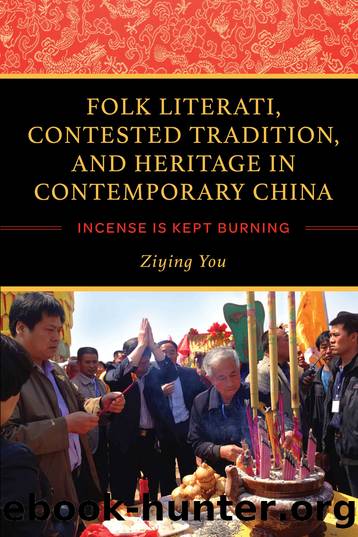Folk Literati, Contested Tradition, and Heritage in Contemporary China by Ziying You

Author:Ziying You [You, Ziying]
Language: eng
Format: epub
Tags: Social Science, Folklore & Mythology, History, Asia, China, Anthropology, General
ISBN: 9780253046390
Google: 65zSDwAAQBAJ
Publisher: Indiana University Press
Published: 2020-02-11T04:22:58+00:00
Overall, I think Li Xuezhi has balanced the opinions from different perspectives and made the storytelling of Ehuang and Nüyingâs conflict into a dynamic interactive process. This process is socially and culturally reflexive, and such dimensions of consciousness are crucial in illuminating folk literatiâs creative agency in debating local legends.
Competing Folk Literati in Yangxie: Wang Kaiyuan and Pei Beiji
In Yangxie, Wang Kaiyuan and Pei Beiji have both been influenced by Qiao Guoliang, and both regard him as a role model. Despite their mutual connection to Qiao, Wang and Pei composed competing renditions of the legends of Ehuang and Nüying in the late 2000s. Given this conflictive relationship, the life stories of Wang and Pei and their literary representations will shed light on folk literatiâs competing agency in the remaking of local legends within local communities.
Wang Kaiyuan was born in Yangxie Village on November 2, 1951; he died in an accident on June 10, 2009.3 He was the main electrician in Yangxie from 1968 to 1985 and later ran his own restaurantâthe Kaiyuan Restaurantâfrom 1986 to 2008. He was the associate head of the Southern shè in Yangxie from 1982 to 1988, actively participating in the official revival of local traditions in the 1980s. In 1982, Wang, Qiao Guoliang, and other shè executors were sent to prison in Mamu (马ç§) because they revived the annual ritual processions of receiving deities on the third day of the third lunar month in public; they were kept there for fifteen days. In 1985 Wang was again detained in the local police station with other shè executors in Yangxie because they had remade the divine sedan chair for their aunties; this time they were imprisoned for seven days. During the annual ritual processions, Wangâs main responsibilities were to contact shè executors or temple heads from other villages that were involved in the processions and coordinate with them to arrange accommodations. When promoting the local traditions as Chinaâs national intangible cultural heritage from 2006 to 2008, he extended his hospitality to folklorists who conducted fieldwork in the local communities and actively contributed to the collection of sources on local traditions. From 2006 to 2009, he collected some local legends and published several articles on local traditions (Wang and Yan 2006; Wang 2008, 2009a, 2009b).
Even though Wang Kaiyuan was not formally well educated, he trained and educated himself while promoting local traditions in the late 2000s. He accompanied folklorists conducting fieldwork in Hongtong, and as a result, he got to know many local legends and written classics on local traditions. However, because of his limited education, it was not easy for him to compile these important historical sources, and so he invited Wang Quansuo, a retired teacher from Yangxie, to collaborate with him to write the manuscript âLegends and Anecdotes of the Two Sages Ehuang and Nüyingâ (Ehuang Nüying erwei shengxian chuanwen yishi) or âLegends and Anecdotes of Ehuang and Nüyingâ (Ehuang Nüying yishi chuanwen) (Wang and Wang 2007â9). Unfortunately, Wang Kaiyuan fell off the roof of his two-story house on June 10, 2009, and died soon afterward.
Download
This site does not store any files on its server. We only index and link to content provided by other sites. Please contact the content providers to delete copyright contents if any and email us, we'll remove relevant links or contents immediately.
The Daily Stoic by Holiday Ryan & Hanselman Stephen(3287)
The Fate of Rome: Climate, Disease, and the End of an Empire (The Princeton History of the Ancient World) by Kyle Harper(3045)
People of the Earth: An Introduction to World Prehistory by Dr. Brian Fagan & Nadia Durrani(2718)
Ancient Worlds by Michael Scott(2660)
Babylon's Ark by Lawrence Anthony(2659)
The Daily Stoic by Ryan Holiday & Stephen Hanselman(2560)
Foreign Devils on the Silk Road: The Search for the Lost Treasures of Central Asia by Peter Hopkirk(2451)
India's Ancient Past by R.S. Sharma(2438)
MOSES THE EGYPTIAN by Jan Assmann(2406)
The Complete Dead Sea Scrolls in English (7th Edition) (Penguin Classics) by Geza Vermes(2268)
The Earth Chronicles Handbook by Zecharia Sitchin(2211)
Lost Technologies of Ancient Egypt by Christopher Dunn(2210)
24 Hours in Ancient Rome by Philip Matyszak(2071)
Alexander the Great by Philip Freeman(2052)
Aztec by Gary Jennings(2008)
The Nine Waves of Creation by Carl Johan Calleman(1901)
Curse Tablets and Binding Spells from the Ancient World by Gager John G.;(1856)
Before Atlantis by Frank Joseph(1842)
Earthmare: The Lost Book of Wars by Cergat(1813)
